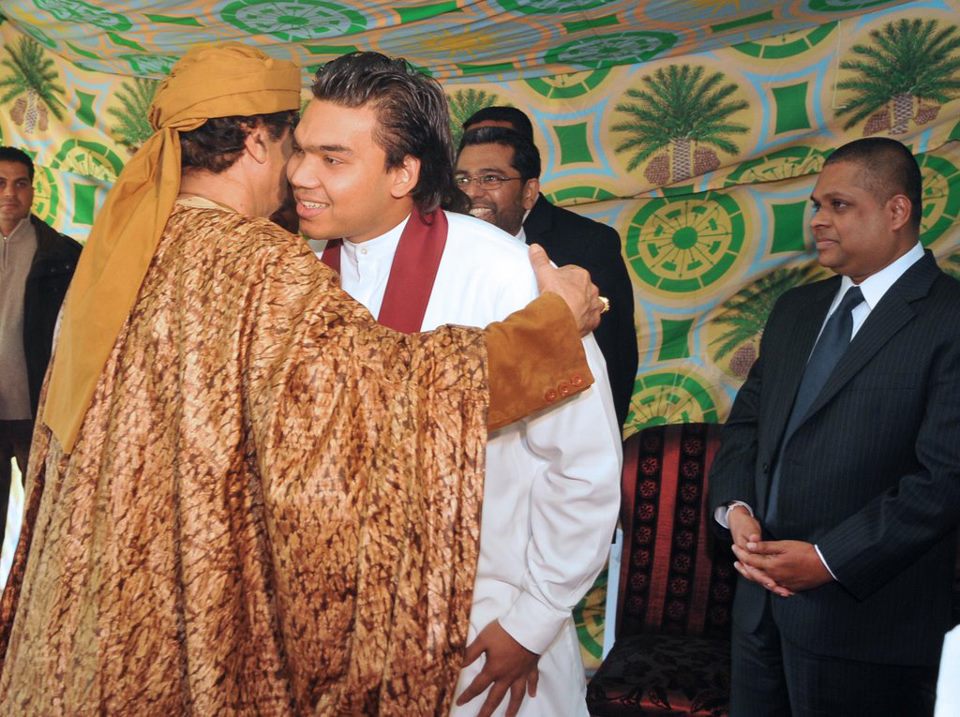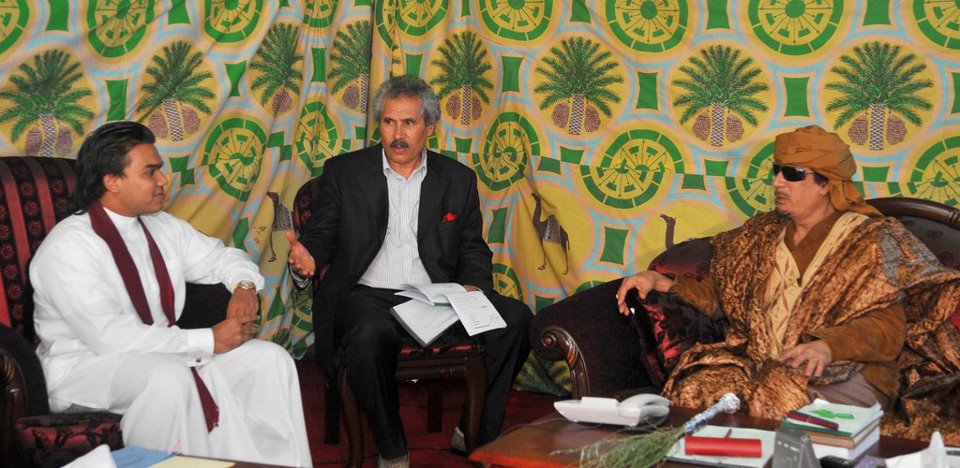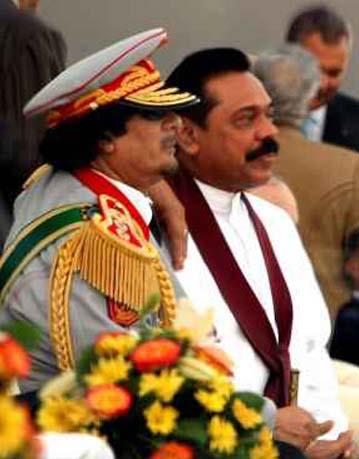Tyrants and Their Families: Gaddafis and Rajapaksas
“Muammar is leader of the revolution until the end of time…. When they (the protestors) are caught they will beg for mercy, but we will not be merciful.” — Muammar Gaddafi (Address to the Nation – 22.2.2011)

January 18, 2011, Parliamentarian Namal Rajapaksa, eldest son of President Rajapaksa (‘The Universally-Renowned Lord of the Three-Sinhala Lands’), met Muammar Gaddafi (‘Eternal Brother Leader of the Revolution’ and ‘King of Kings’). The picturesquely attired Gaddafi embraced young Rajapaksa, who was heading a ‘parliamentary delegation’ consisting solely of UPFA representatives: Sajin Vaas Gunawardena, Duminda Silva, Lohan Ratwatte and Thirantha Basnayake. Rajapaksa reminded Gaddafi that he owes Sri Lanka the honour of a reciprocal-visit, as Rajapaksa has visited Libya, twice.
Since then the democracy contagion has infected Libya and ‘Brother Leader’ is busy launching a blood-bath to save himself. Appearing on state television, he called the protesting Libyan youth ‘drug-infested mice’ and threatened to ‘cleanse Libya, house by house’. 48 hours previously, his son and putative heir, Saif al-Islam, also came on TV, declaring his father will fight to the last man, woman and bullet to prevent an Egyptian/Tunisian outcome in Libya.
The Egyptian and Libyan Revolutions provide a rare window into the inner-workings of despotic-political dynasties in the Third World. These insights are of immense relevance to us, as President Rajapaksa works indefatigably to tighten his grip on power and entrench his own dynasty. In

Gaddafi and Namala Rajapakse: "January 18, 2011, Parliamentarian Namal Rajapaksa, eldest son of President Rajapaksa (‘The Universally-Renowned Lord of the Three-Sinhala Lands’), met Muammar Gaddafi (‘Eternal Brother Leader of the Revolution’ and ‘King of Kings’). The picturesquely attired Gaddafi embraced young Rajapaksa, who vas heading a ‘parliamentary delegation’ consisting solely of UPFA representatives: Sajin Vaas Gunawardena, Duminda Silva, Lohan Ratwatte and Thirantha Basnayake. Rajapaksa fils reminded Gaddafi that he owes Sri Lanka the honour of a reciprocal-visit, as Rajapaksa pere has visited Libya, twice."
Sri Lanka, the process is being fast-forwarded; unlike his brother-despots, Rajapaksa came to power not as a young man but on his 60th Birthday, and must work faster to implant Familial Rule and Dynastic succession. Thus the indecent haste with which the First Son is being promoted; for instance, Namal Rajapaksa, though a mere junior-parliamentarian (and no cricketer), presented the ‘Man of the Match’ award at the first Cricket World Cup game in Sri Lanka — held in a stadium named after his Presidential-father, in the family-fief of Hambantota.
Tyrants are vainglorious. They collect titles. They also amass wealth. Having a world to lose, they fear political demise; so do their families. This fear is a key catalyst in the creation of a state-form which has mushroomed in the Third World in the last four decades: familiocracy – a republic manipulated and distorted into a de facto monarchy, where presidential father is succeeded by presidential son. When tyranny is conjoined with dynastic-succession, the family becomes the final and the most obtuse rampart of the ruler.
Thus in Egypt President Mubarak’s son Gamal “…pushed his father to hold on to power even after his top generals and the prime minister were urging an exit…. The defiant tone of the President’s speech on Thursday…was largely his son’s work.” (The New York Times – 13.2.2011). Gaddafi’s sons were notoriously fractious, fighting over spoils of power; but faced with a popular rebellion they have set aside personal differences and liberal pretensions, rallying as one round their Ruler-father.
The West’s main concern in the Third World is not political or social liberalism but economic liberalism (thus the liberal West’s foremost Middle Eastern ally is the politico-social antediluvian Saudi Arabia). From anti-communism to anti-terrorism, Western leaders never lacked arguments to justify their modus vivendi with accommodative familiocracies. Gamal Mubarak and Saif Gaddafi were welcomed in the West as reformers (Saif Gaddafi’s doctoral thesis at the London School of Economics was on creating ‘just and democratic global governing institutions’). But as a Gaddafi-opponent said, “It’s all just a game. Saif cannot do anything without his dad’s blessing. They have a great relationship” (Time – 5.4.2010). Today the ‘liberal’ Saif is the main defender of the Gaddafi-tyranny.
Naturally. Tyrants and their families have too much to lose. The longer they are in power, the less they want to leave. Corruption is a disease common to most politicians but tyrants see no distinction between national and personal wealth. According to a 2006 Wikileaks cable, “All of the Qaddafi children and favourites are supposed to have income streams from the National Oil Company and oil service subsidiaries”.
Meanwhile 33% of Libyan people live below the poverty line, despite the country’s vast mineral wealth. Tyranny is inimical to socio-economic development; tyrants don’t enrich their countries; they enrich their families. But they are excellent showmen and stuntmen.
“Shop owners around the Mahinda Rajapaksa Cricket Stadium in Sooriyaweva have been told by the police to put on sale large king coconuts, bananas and full-grown vegetables to create a good impression among foreign visitors…..the police has advised them also to dress the children in ‘lama sariya’…or other national outfits when they take them on the roads while the matches are played” (The Sunday Times – 20.2.2011).
Last month Sri Lanka imported her first stretch-limousines, even as food-prices soared and nearly 50% of the children in the Eastern Province were diagnosed as malnourished. Colombo police stations are demolishing their walls, because Sri Lanka is safe, while the Emergency and the PTA remain in force, even during election times.
Tunisia and Egypt mark the moment the banner of democracy and human rights was appropriated by the peoples of the Third World. Until then, it was possible to dismiss democracy and human rights as colonial legacies and Western imports. No more. The Arab revolutions demonstrate that the
desire for democracy is a universal one, stemming from man’s natural inclination to escape the permanent political adolescence imposed on him by autocratic-rule and become adult-citizens.
The 21st Century will thus be defined by the Third-World wide contestation between despotic rulers (often nursing dynastic-projects) and their people, with the West playing the role of uneasy spectator. The West’s preoccupation with terrorism has made it abandon the banner of political freedom even in its own heartland. The Open Society is putting-up its shutters, corroded into political-agoraphobia by fears of terrorism, immigration and Islam.
The Rajapaksas, as new entrants to the Third World tyrants club, have cause for alarm. The key role played by new information technologies in enabling Arab uprisings has convinced tyrants that they need to control cyberspace, if they are to maintain their control of geographical and political spaces. For instance, the Chinese Politburo has reportedly decided that “efforts to criticise and control microblogs must be sharply increased…” (New York Review of Books – 20.2.2011).
The Lankan Army Commander is already talking of the need for ‘cyber soldiers’ to wage a ‘cyber war’
against ‘pro-LTTE and anti-Sri Lankan elements’; he mentioned, as an example of cyber-foes, Wikileaks, which became a catalyst of the Tunisian Revolution via its leaked cables.
The upcoming local government poll is the first post-18th Amendment election. Already the insidious effects of that anti-democratic constitutional-change are visible, not just in the high levels of violence and malpractices but also in the anti-vertebrae decision by the Elections Commissioner to unilaterally postpone polling in 56 councils, sans even a court order.
As per plan; after all the transformation of independent commissions into appendages of a presidency without term-limits via the 18th Amendment was intended to turn the Elections Commissioner (and other officials) into presidential stooges. Such a transformation is vital in instituting an electoral system in which many parties compete but only the ruling party wins, enabling decades of Rajapaksa-rule, Father and Son.
This article is a repeat post. It was first posted on February 26, 2011





